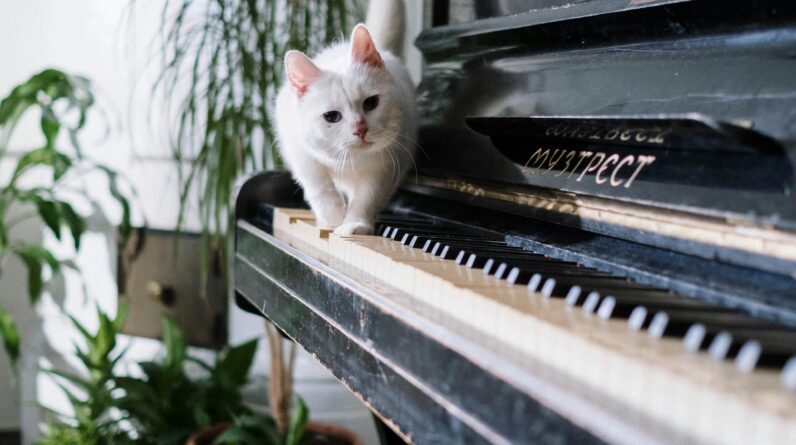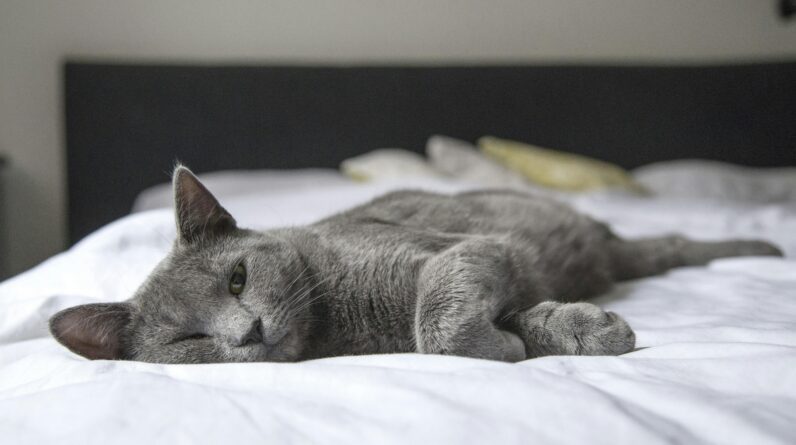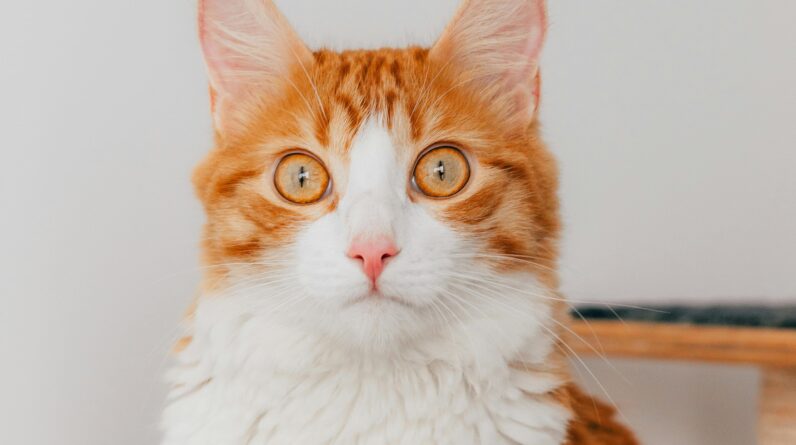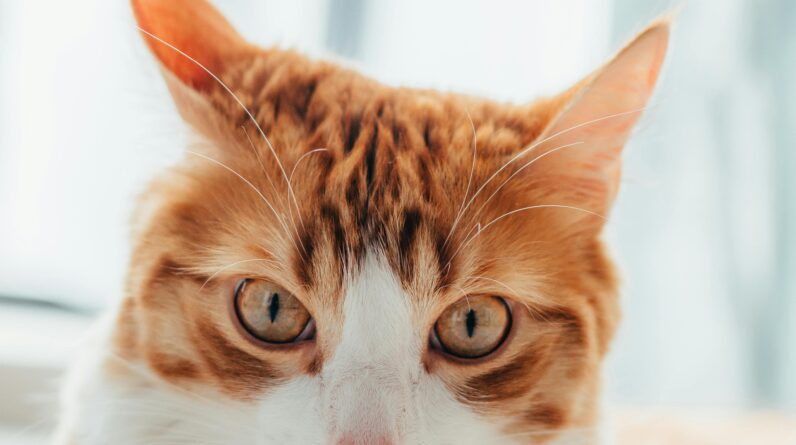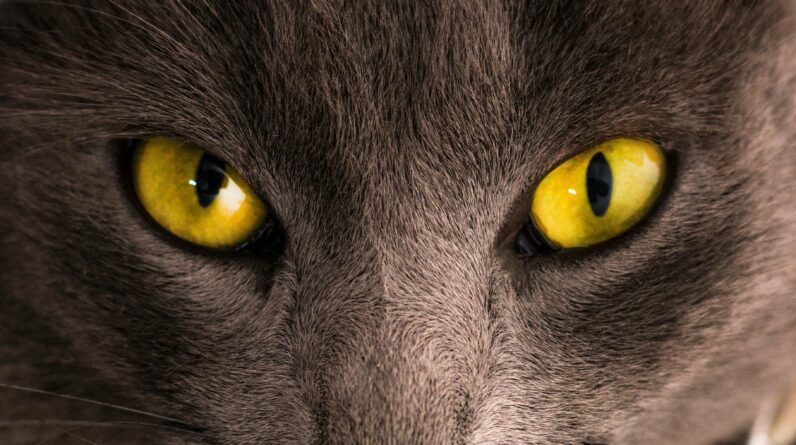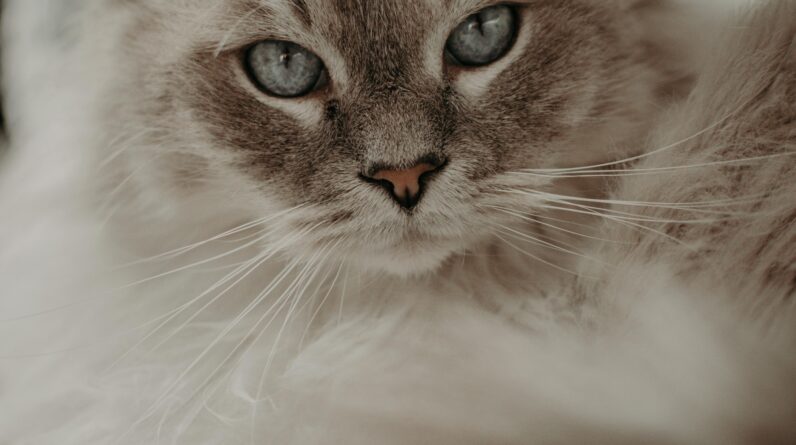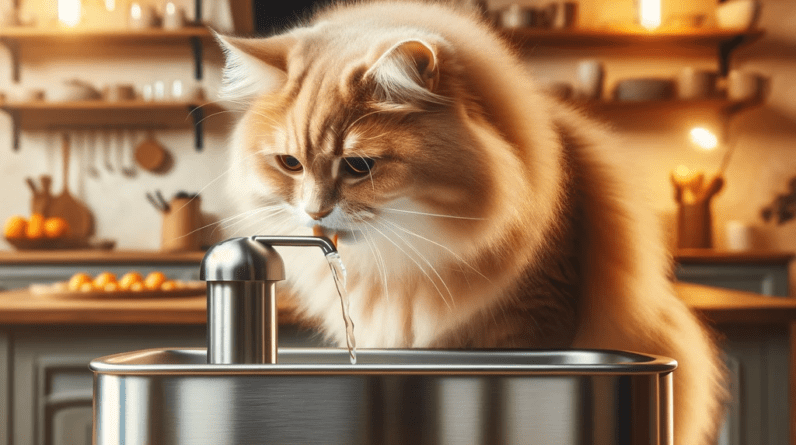
Easy to Clean Water Fountains for Ginger Cats: The Ideal Choice for Your Feline Friend
Ginger cats, known for their vibrant fur and playful nature, deserve the best care.
A key aspect of this care is hydration.
Water fountains not only encourage cats to drink more water, thus promoting better kidney health and hydration, but they also offer a fresh source of water that’s vital for their well-being.
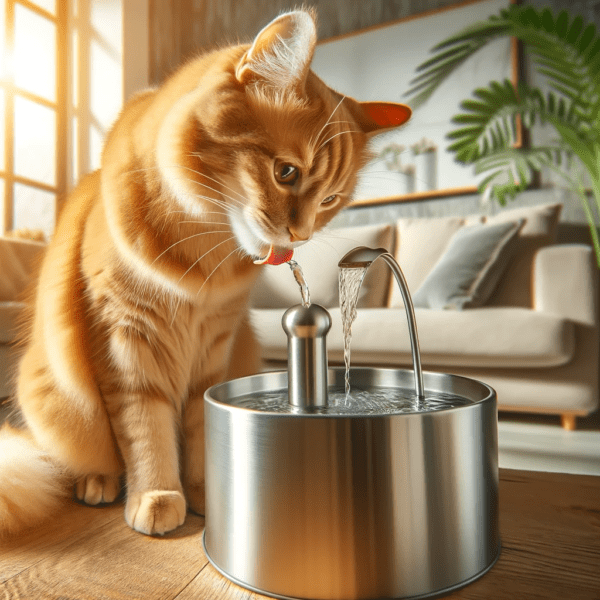

The Importance of Cleanliness
Why emphasize an ‘easy to clean’ fountain?
Simple: hygiene.
A clean water source is crucial for preventing bacterial growth and ensuring your cat’s health.
Ginger cats, like all cats, can be prone to acne and other skin issues, often exacerbated by dirty water bowls.
Why Water Fountain?
Choosing a water fountain over a traditional bowl for cats offers several benefits, both for the cat and the owner.
Encourages Hydration
Many cats are naturally inclined to drink less, which can lead to health issues.
A water fountain can entice cats to drink more because the movement of the water makes it more appealing.
Cats often prefer running water as it mimics natural sources and is perceived as fresher and cleaner.
Better Water Quality
Fountains typically come with filters that help purify and soften the water, removing impurities and smells.
This gives your cat access to clean water throughout the day, which is not always the case with a stagnant bowl of water.
Reduces Bacteria Growth
Standing water in bowls can become a breeding ground for bacteria, algae, and mold, especially if not changed regularly.
The constant circulation in a water fountain helps prevent this growth, ensuring a healthier drinking source.
Freshness and Oxygenation
The movement in a water fountain introduces oxygen to the water, keeping it fresher for longer.
This can make the water more appealing to cats and can encourage them to drink more.
Natural Behavior
Many cats enjoy drinking from running water sources.
This behavior is often observed with cats drinking from taps or dribbling faucets.
A water fountain mimics this natural preference, which can lead to better hydration habits.
Convenience for Owners
With a larger capacity and filters to keep the water clean, fountains require less frequent refills and maintenance compared to regular bowls.
This can be more convenient for cat owners, especially those with a busy schedule.
Health Benefits
Proper hydration is crucial for a cat’s health.
It helps in kidney function, temperature regulation, and overall health.
Increased water intake can prevent urinary tract diseases and other health issues associated with dehydration.
Reduced Whisker Fatigue
Some water fountains are designed with a broad surface area that allows cats to drink without their whiskers touching the sides of a bowl.
Whisker fatigue can be stressful for cats, and a fountain can alleviate this discomfort.
In summary, water fountains can enhance a cat’s interest in drinking water while providing a clean, fresh, and healthy source of hydration.
This can be particularly beneficial for cats prone to urinary tract issues or those who have a tendency to drink less water.
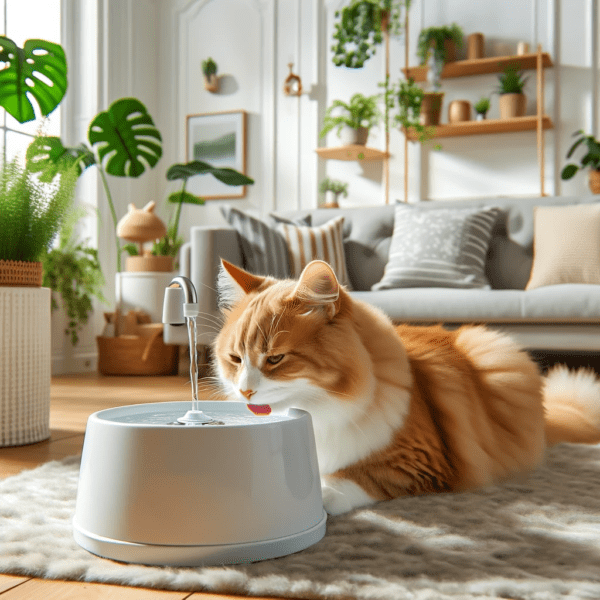

Selecting the Right Fountain: Material Matters
When choosing a water fountain, consider the material.
Plastic fountains are common but can harbor bacteria and cause chin acne in cats.
Ceramic and stainless steel options, though slightly more expensive, are easier to clean and more hygienic.
Our Top Picks for Easy to Clean Water Fountains for Ginger Cats
Petkit Eversweet 2
This fountain is known for its efficient filtration system, quiet operation, and dishwasher-safe construction.
It’s a smart, efficient choice for pet owners.
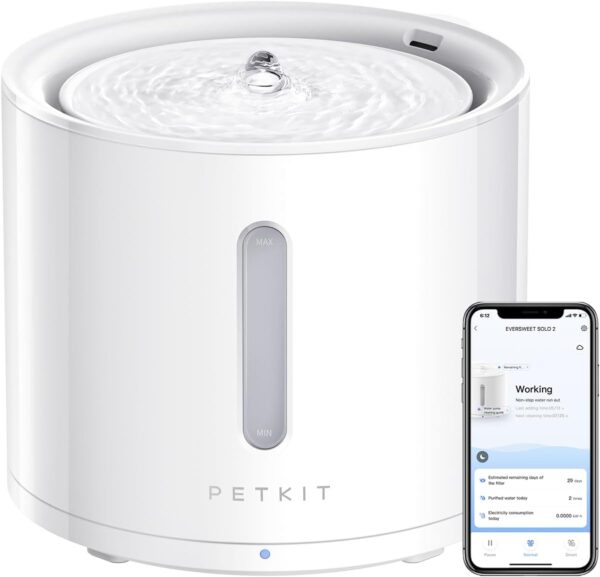

POLAME Stainless Steel Cat Water Fountain
Ideal for small spaces, this stainless steel fountain is compact, quiet, and dishwasher-safe.
It’s particularly suitable for cats with chin acne due to its stainless steel base.
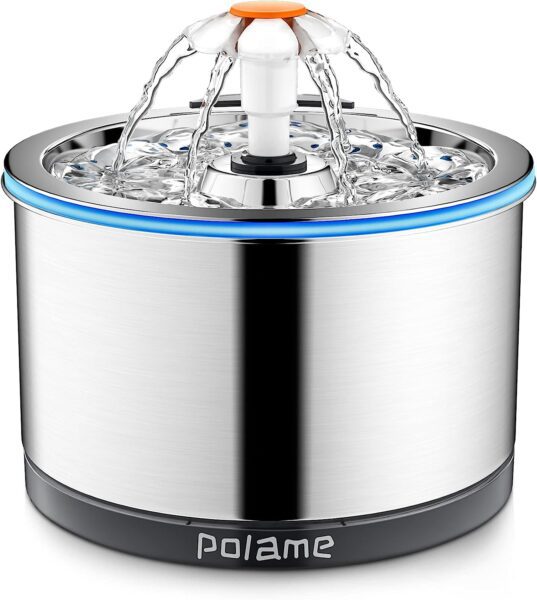

iPettie Tritone Ceramic Pet Drinking Fountain
If you prefer a ceramic option, this fountain is made from porcelain, easy to clean, and also dishwasher safe.
However, it’s a bit larger and might not be ideal for small spaces.


Veken Automatic Cat Water Fountain
This BPA-free plastic fountain is an affordable option, featuring LED indicators for refill reminders, adjustable water flow, and is mostly pre-assembled for easy setup.
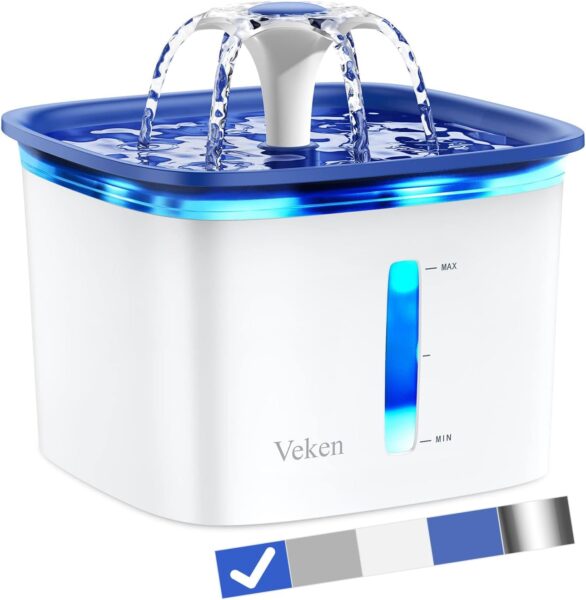

Pioneer Pet Stainless Steel Cat Fountain
Available in two sizes, this fountain has a modern design, uses a replaceable charcoal filter, and is dishwasher safe.
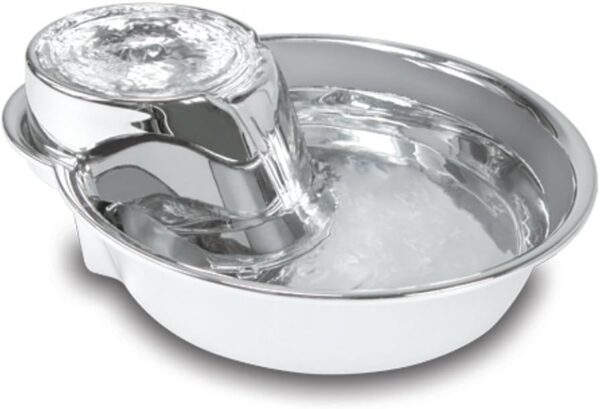

Cat Mate Plastic Cat Fountain
This fountain offers multi-height drinking levels and operates quietly.
It’s vet-recommended and dishwasher safe.
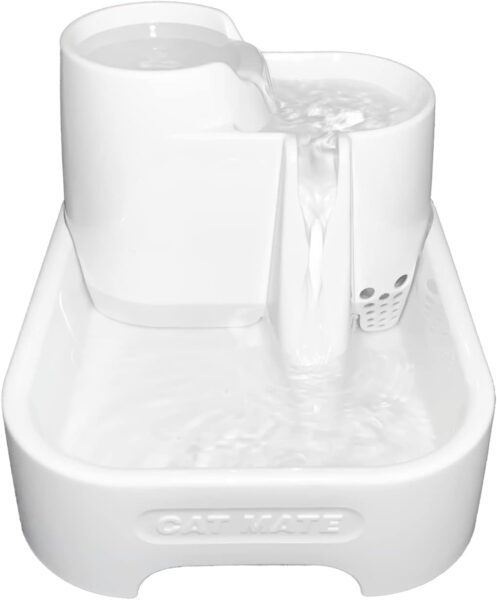

Drinkwell Platinum Plastic Cat Fountain
Ideal for multi-cat households due to its large capacity.
It’s made from BPA-free plastic and has a free-falling stream design to encourage cats to drink.


Pet Fit for Life Plastic Cat Water Fountain
Featuring a raised drinking platform and quiet operation, this plastic fountain also has four different flow settings, making it versatile for different cat preferences.
Here is a comparison table of the cat water fountains, detailing their features, materials, capacity, whether they are dishwasher safe, and their pros and cons.
Note that the price range and some specific details like the capacity of certain models were not available.
| Fountain Name | Material | Capacity (Liters) | Dishwasher Safe | Price Range (Approx.) | Pros | Cons |
|---|---|---|---|---|---|---|
| Petkit Eversweet 2
| Acrylonitrile Butadiene Styrene (ABS) | 2 L | Yes | $ 49.99 | Efficient filtration, quiet operation | |
| POLAME Stainless Steel
| Stainless Steel/Plastic | 2.1 | Yes | $ 29.99 | Compact, quiet, good for small spaces | Can be tricky to tell when it needs refilling |
| iPettie Tritone Ceramic
| Porcelain | 2.1 | Yes | $ 69.99 | Easy to clean, stylish | Prone to chipping, large size |
| Veken Automatic
| BPA-free Plastic | 2.8 L | Yes | $ 23.99 | Affordable, LED indicators | Frequent filter changes required |
| Pioneer Pet Stainless Steel
| Stainless Steel | 1.8/2.8 | Yes | $ 63.79 | Replaceable filter, sleek design | Can get noisy, water in bowl may get dirty |
| Cat Mate Plastic
| Plastic | 2 l | Yes | $ 24.99 | Quiet operation, multi-height drinking | Can encourage slime formation, difficult to clean |
| Drinkwell Platinum Plastic
| BPA-free Plastic | 5 | Yes | $ 48.95 | Large capacity, continuous circulation | Expensive, can collect slime |
| Pet Fit for Life Plastic
| Plastic | 2 l | No | $ 34.95 | Quiet operation, various flow settings | Not dishwasher safe, top attachment comes off easily |
This table should help you compare the available options and choose the one that best suits your needs and the preferences of your cat.
So, Which One is the Best and Easiest to Clean?
- POLAME Stainless Steel Fountain: Best for small spaces and cats with chin acne due to its stainless steel construction.It’s compact, quiet, and dishwasher-safe, making it a great choice if you live in a smaller apartment or want a low-maintenance option.
- iPettie Tritone Ceramic Fountain: Ideal if you’re looking for a stylish, plastic-free option.It’s made of porcelain, easy to clean, and dishwasher-safe.However, it’s larger and prone to chipping, so it’s better for a spacious area and requires careful handling.
- Pioneer Pet Stainless Steel Fountain: A good choice if you’re looking for a sleek design and have a preference for stainless steel.It offers two size options and is dishwasher-safe, but it can be noisy and the water in the bowl might get dirty, requiring regular cleaning.
- Veken Automatic Cat Water Fountain: This is an affordable, BPA-free plastic option with LED indicators and adjustable water flow, making it a versatile choice.However, it requires frequent filter changes.
- Cat Mate Plastic Fountain: This is vet-recommended, quiet, and offers multi-height drinking levels.It’s dishwasher-safe but can encourage slime formation and might be difficult to clean thoroughly.
- Drinkwell Platinum Plastic Fountain: Suitable for multi-cat households due to its large capacity.While it’s made of BPA-free plastic, it can be expensive and difficult to clean.
- Pet Fit for Life Plastic Fountain: Offers a raised drinking platform and various flow settings, suitable for larger breed cats.However, it’s not dishwasher safe and has a flimsy design.
- Petkit Eversweet 2: Known for efficient filtration and quiet operation, but specific details like material and capacity are unknown.
In summary, if you prioritize ease of cleaning and have a smaller space, the POLAME Stainless Steel Fountain might be the best choice.
For those preferring a stylish, ceramic option, the iPettie Tritone Ceramic Fountain could be ideal, though it requires careful handling.
For a balance of design and functionality, the Pioneer Pet Stainless Steel Fountain is a strong contender.
Your ultimate choice should align with your specific needs, the preferences of your cat, and your home environment.
Cleaning Tips for Your Cat’s Water Fountain
Regular Cleaning: Clean the fountain at least once a week.
Use mild soap and warm water, ensuring to rinse thoroughly to remove any soap residue.
Filter Changes: Replace filters as recommended by the manufacturer to maintain water freshness and fountain functionality.
Vinegar for Tough Stains: For stubborn stains or mineral build-up, use a vinegar solution. This natural cleaner is effective and safe for your cat.
An ‘easy to clean water fountain’ for your ginger cat is more than just a convenience; it’s a commitment to their health and happiness.
By choosing the right material and design, and maintaining regular cleaning, you provide your feline friend with a constant source of fresh water, keeping them hydrated and healthy.
Remember, a happy cat is a hydrated cat, and with these easy-to-clean water fountains, you’re ensuring just that for your beloved ginger cat.
FAQs:
Q: How often should I clean my cat’s water fountain?
A: It’s recommended to clean your cat’s water fountain at least once every two weeks.
However, for optimal hygiene and to prevent the buildup of bacteria and slime, a weekly cleaning is ideal.
Q: Are water fountains safe for all cats?
A: Yes, water fountains are generally safe for all cats.
They encourage hydration and provide a constant supply of fresh water.
However, it’s important to ensure the fountain is made from non-toxic materials and kept clean.
Q: Can water fountains help prevent health issues in cats?
A: Absolutely. Proper hydration is crucial for a cat’s health and can help prevent urinary tract infections, kidney issues, and other dehydration-related health problems.
Q: Is it difficult to assemble a cat water fountain?
A: Most cat water fountains are designed for easy assembly.
They usually come with clear instructions and can be set up within minutes.
Some models may have more components, but generally, they’re user-friendly.
Q: What should I look for in a good cat water fountain?
A: Look for a fountain that’s easy to clean, made from hygienic materials like stainless steel or ceramic, has a good filtration system, is the right size for your space, and operates quietly.
Q: Can I use tap water in the fountain?
A: Yes, you can use tap water in most cat water fountains.
However, if your tap water is high in minerals or impurities, consider using filtered water to extend the life of the fountain and its filter.
Q: How often should I replace the water in the fountain?
A: It’s best to change the water in the fountain at least once a week to ensure it remains fresh and clean.
If you notice debris or the water becomes cloudy sooner, change it more frequently.
Q: Are plastic fountains a good choice?
A: While plastic fountains are generally more affordable, they may harbor bacteria and cause chin acne in cats.
If you choose a plastic fountain, ensure it’s BPA-free and cleaned regularly.
Q: Do all water fountains for cats have filters?
A: Most modern cat water fountains come equipped with filters, usually carbon or charcoal, to purify the water and remove impurities and odors.
Q: Will my cat prefer a water fountain over a bowl?
A: Many cats are naturally attracted to running water and may prefer a fountain over a still water bowl.
However, each cat is unique, and some may need time to adjust to the fountain.


